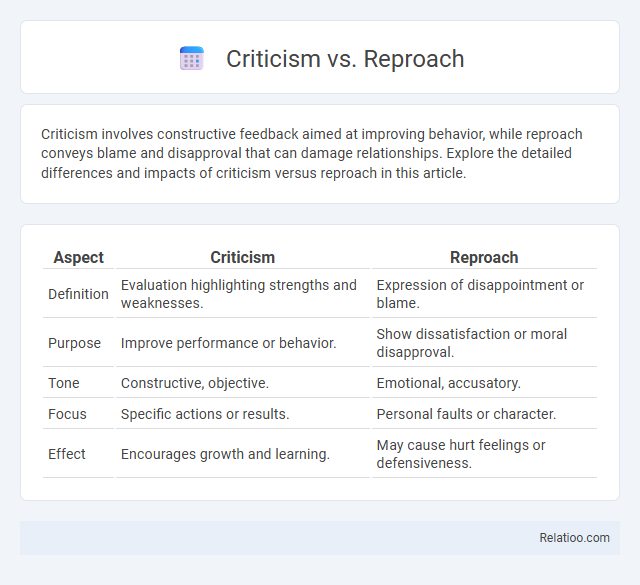Criticism involves constructive feedback aimed at improving behavior, while reproach conveys blame and disapproval that can damage relationships. Explore the detailed differences and impacts of criticism versus reproach in this article.
Table of Comparison
| Aspect | Criticism | Reproach |
|---|---|---|
| Definition | Evaluation highlighting strengths and weaknesses. | Expression of disappointment or blame. |
| Purpose | Improve performance or behavior. | Show dissatisfaction or moral disapproval. |
| Tone | Constructive, objective. | Emotional, accusatory. |
| Focus | Specific actions or results. | Personal faults or character. |
| Effect | Encourages growth and learning. | May cause hurt feelings or defensiveness. |
Understanding Criticism and Reproach
Criticism involves evaluating actions or ideas with the intent to improve, often based on objective standards and constructive feedback, while reproach focuses on expressing disappointment or disapproval, typically highlighting fault or blame. Understanding criticism means recognizing it as a tool for growth that separates behavior from personal identity, whereas reproach centers on emotional reaction and moral judgment. Effective communication navigates these differences by fostering open dialogue in criticism and addressing feelings with empathy in reproach.
Defining Criticism: Purpose and Approach
Criticism involves evaluating or analyzing a subject to identify strengths and weaknesses, aiming to provide constructive feedback for improvement. Unlike reproach, which emphasizes blame or disapproval, criticism seeks to foster growth and understanding by focusing on specific actions or outcomes rather than personal faults. Your ability to discern between criticism and reproach enhances communication and promotes a more effective and positive environment for development.
Defining Reproach: Origins and Intent
Reproach originates from the Latin word "reprobare," meaning to disapprove or reject, embodying a direct expression of disappointment or blame towards someone's actions. Unlike criticism, which can be analytical and constructive, reproach carries an emotional weight aimed at highlighting perceived faults or moral failings. Your understanding of reproach deepens when recognizing its intent is often to evoke guilt or self-reflection rather than just to evaluate or improve.
Key Differences Between Criticism and Reproach
Criticism involves analyzing or evaluating actions or ideas, often providing constructive feedback to improve performance or behavior. Reproach expresses disapproval or disappointment, focusing on a moral or emotional judgment rather than objective assessment. Understanding these key differences helps you communicate more effectively by distinguishing between helpful evaluation and emotional response.
Psychological Impact of Criticism vs Reproach
Criticism often targets specific behaviors or actions, providing constructive feedback that can foster personal growth when delivered thoughtfully. Reproach, by contrast, tends to convey disapproval more emotionally and personally, which can trigger feelings of shame or guilt and potentially harm self-esteem. Understanding the psychological impact of these responses is crucial, as criticism encourages reflection and improvement, while reproach may evoke defensive or negative emotional reactions.
Constructive Criticism: Benefits and Techniques
Constructive criticism fosters personal and professional growth by offering specific, actionable feedback that empowers individuals to improve performance without damaging self-esteem. Techniques such as using "I" statements, focusing on behaviors rather than personal attributes, and balancing positive comments with areas for improvement enhance receptiveness and motivation. Unlike reproach, which often implies blame or disapproval, constructive criticism aims to build trust and encourage development through respectful communication.
The Harm of Reproach in Communication
Reproach often involves expressing blame or disappointment in a way that damages relationships and undermines trust, making it more harmful than constructive criticism. Unlike objective criticism, reproach targets personal faults, which can provoke defensiveness and escalate conflicts in communication. Understanding the harmful impact of reproach highlights the importance of delivering feedback with empathy to maintain positive and effective interactions.
Navigating Criticism in Personal Relationships
Navigating criticism in personal relationships requires understanding the differences between criticism, reproach, and reprimand to maintain emotional balance and effective communication. Criticism often targets specific behaviors with constructive intent, while reproach conveys disappointment and can trigger defensiveness; reproach, used sparingly, expresses disapproval but risks straining trust. Prioritizing clear, empathetic dialogue transforms criticism from a source of conflict into an opportunity for growth and strengthened bonds.
Reproach in the Workplace: Effects and Solutions
Reproach in the workplace often leads to decreased employee morale, increased stress, and reduced productivity due to its negative emotional impact. Unlike constructive criticism that aims to improve performance, reproach can create a hostile environment and damage professional relationships. Implementing clear communication strategies, promoting a culture of respect, and providing training on effective feedback can significantly mitigate the harmful effects of reproach and foster a more positive organizational climate.
Choosing Effective Feedback: Criticism over Reproach
Choosing effective feedback involves prioritizing criticism, which provides constructive analysis aimed at improvement, over reproach, which often conveys blame and can evoke defensiveness. Criticism focuses on specific behaviors and actionable suggestions, fostering growth and understanding, whereas reproach typically targets personal faults, hindering productive dialogue. Emphasizing criticism in feedback enhances communication, motivation, and performance within personal and professional relationships.

Infographic: Criticism vs Reproach
 relatioo.com
relatioo.com